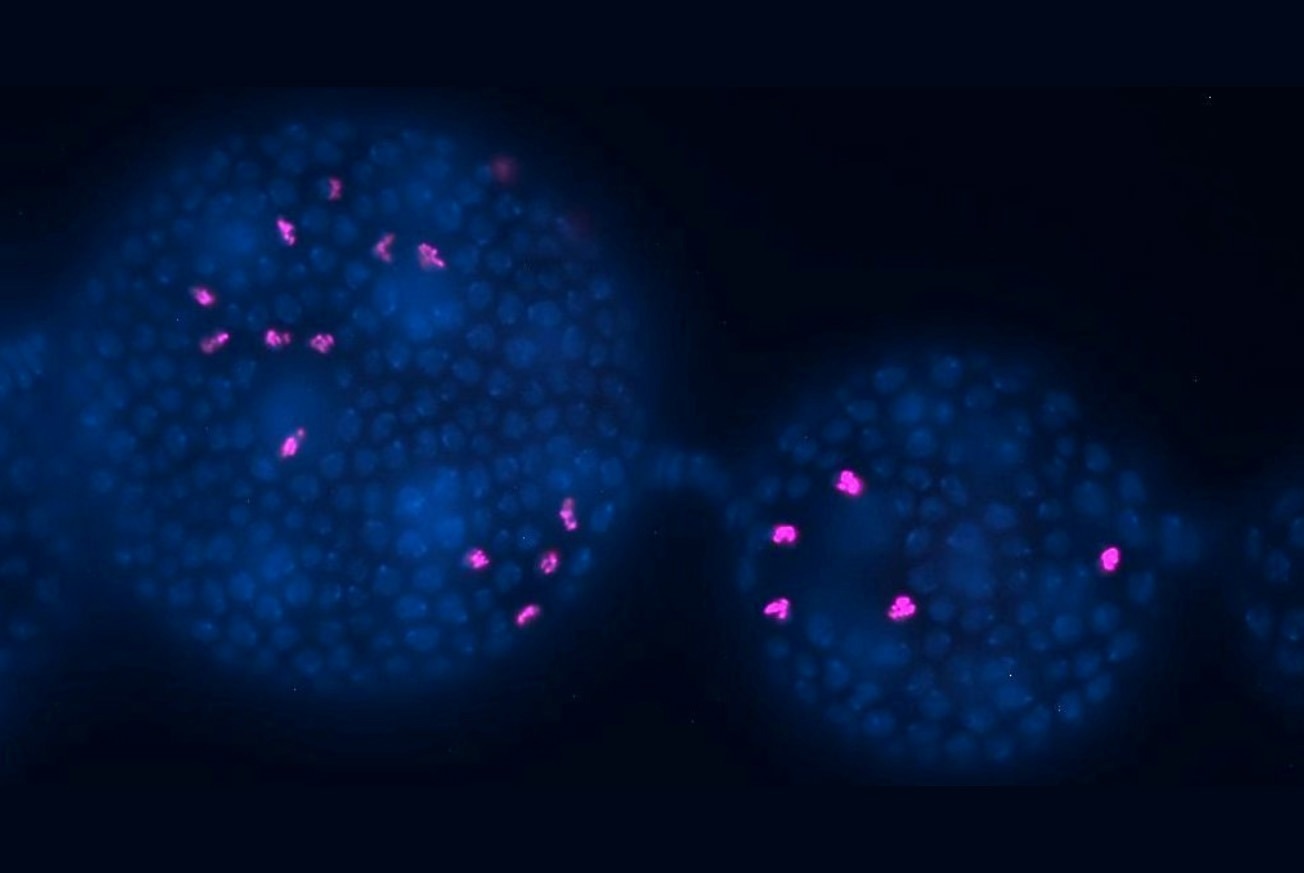Worms may not be depressed. However, this does not prevent them from benefiting from antidepressants.

A portion of the ovariole of the female fruit fly. The larger spheres (two can be seen) are egg chambers. Each chamber contains a future egg and associated nurse cells (some of these can be seen as hazy out of focus outlines). The covering sheet is made of follicle cells (shown in blue). Fluoxetine (Prozac) increases the division (in magenta) of follicle cells in flies. Image Credit: Ilya Ruvinsky/Northwestern University.
Northwestern University researchers utilized selective serotonin reuptake inhibitors (SSRIs), a family of drugs used to treat depression and anxiety, on roundworms (a well-established model organism in biological research). Surprisingly, this intervention enhanced the quality of egg cells in aging females.
Exposure to SSRIs not only reduced embryonic death by more than twofold, but it also reduced chromosomal abnormalities in surviving offspring by more than twofold. Egg cells also appeared younger and healthier under the microscope, appearing round and plump rather than small and malformed, as is frequent with aging.
The researchers were so taken with the results that they repeated the experiment on fruit flies, another frequent model organism, and the SSRIs had the same impact.
Although much more research is required, the researchers say their findings open up new avenues for investigating pharmacological interventions that could combat infertility in humans by improving egg quality and delaying the onset of reproductive aging.
The findings will be published in the journal Developmental Biology on May 8th, 2023.
There is still a great distance between this new finding and the fertility clinic. But the more we study the reproductive system, the better we understand it and the more opportunities we have for developing practical interventions.”
Ilya Ruvinsky, Study Lead, Northwestern University
Ruvinsky is an Associate Research Professor at the Weinberg College of Arts and Sciences at Northwestern University. The paper’s first author is Erin Aprison, a Research Associate in Ruvinsky’s laboratory. The paper was co-authored by Svetlana Dzitoyeva, a Postdoctoral Researcher in Ruvinsky’s laboratory.
Cutting Out the Middleman
Ruvinsky’s team previously demonstrated that male pheromones reduced the aging of female egg cells. The earlier study, which was published in the Proceedings of the National Academy of Sciences in May 2022, exposed female roundworms to male pheromones, which resulted in better progeny.
When female roundworms detected male pheromones, they diverted their energy and resources away from overall bodily health and toward improved reproductive health.
The pheromone coaxes the female into sending help to her eggs and shortchanging the rest of her body. It’s not all or nothing; it’s shifting the balance.”
Ilya Ruvinsky, Study Lead, Northwestern University
Ruvinsky and his colleagues decided to drop male pheromones out of the equation totally in the new study.
The neurons that signal the body to shift its resources rely on serotonin as the messenger. We identified those neurons in previous work and wondered if we could tap directly into that system. Maybe we could stimulate the serotonin system with pharmaceuticals, bypassing the need for male pheromones. Lo and behold, we saw better eggs by every measure.”
Ilya Ruvinsky, Study Lead, Northwestern University
Delaying Decline
To carry out the research, the investigators fed aging roundworms a low dose of SSRIs. The study focused on the effects of fluoxetine (Prozac) but included citalopram (Celexa) and zimelidine.
The aging worms were continuously exposed to SSRIs at concentrations equal to those used to treat anxiety and depression in humans. Although egg quality typically declines as the worms age, worms treated with fluoxetine were able to delay the decline.
“When we only delivered a temporary regimen of the drug and then withdrew it, the egg quality stayed high for a while but then quickly decreased. We think it’s because they need a continuous signal,” Ruvinsky said.
Ruvinsky and his colleagues also discovered that when roundworms were exposed to fluoxetine, they produced more egg cell precursors. However, in an apparent counterproductive twist, more of these cells died. However, this is also an advantage.
Ruvinsky details, “How do you get the components to make higher-quality eggs? You take components from other eggs. Many eggs die and get sent to the ‘salvage yard.’ You break up the parts and use those for the few eggs that survive.”
Shared Signaling
Ruvinsky’s team reproduced the investigation in fruit flies to see if the finding was unique to worms. Once again, fluoxetine treatment improved egg quality in older female flies.
Although worms, flies, and humans appear to have little in common, they actually have more in common than most people realize.
Ruvinsky concludes, “This neuronal system does more or less the same thing in various animals. More serotonin in the brain causes animals to focus on food instead of exploring their surroundings. That’s true for mammals, flies, and worms. We might not be able to widen the fertility window to 60 years. But even if we could add a year or two to a person’s fertility window, that would make a big difference.”
Source:
Journal reference:
Aprison, E. Z., et al. (2023). Serotonergic signaling plays a deeply conserved role in improving oocyte quality. Developmental Biology. doi.org/10.1016/j.ydbio.2023.04.008.